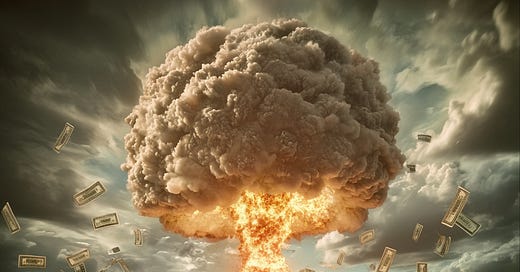Money is a Test (What Money Means)
"Everyone understands a million dollars. There's not a person in the world who does not understand a million dollars." - Taylor Sheridan (Yellowstone, Sicario)
I have been reading Secondhand Time, Svetlana Alexievich’s book about the fall of the Soviet Union. A self-described “human ear,” she approached history by assembling anecdotes and interviews. “When I walk down the street and catch words, phrases, and exclamations,” she said, “I always think — how many novels disappear without a trace.”
It is a book about dealing with change and suffering, about war, the gulag, and an unexpected revolution. But a level below that I found people wrestling with the rapid and profound change brought about by money. Practically overnight, the formerly communist citizens had to make sense of it. “We had to relearn how to live from scratch,” one woman explained. “Before, I had hated money, I didn’t know what it was. My family never talked about it—it was considered shameful. We grew up in a country where money essentially did not exist.”
Money transformed lives, altered values, and turned hierarchies upside down. One communist party secretary recalled meeting her former driver who she barely recognized in his “buzz cut, leather jacket, and tracksuit.” The man had joined the new elite of entrepreneurs, hustlers, and gangsters. While the party was going out of business, he was making a fortune with jeans.
“He bragged about making more money in one day than the first secretary of the district Party committee made in a month,” the woman recalled. “These jeans-mongers will be the ones running our government,” she realized in horror. “They’ll build their factories up from the basements.” And that, she reminisced years later, was exactly what happened.
Yuval Harari called money the “most successful story ever” and “the most universal and most efficient system of mutual trust ever devised.” For Soviet citizens, it was a new story. “The discovery of money hit us like an atom bomb,” one of them explained.
“Not everybody believes in God, not everybody believes in human rights, not everybody believes in nationalism, but everybody believes in money.” — Yuval Harari
There are many ways of looking at money: its function, its qualities, who owns it, where it flows, who controls its supply, and who sets its price. Elon Musk views money as information, a “database for resource allocation across time and space.” Brett Scott framed it as a network, a nervous system. A story, a promise, a system of trust, a way to transact, a network, a representation of our productive and creative capacity — money is all of these analogies and many more.
We take money for granted. It is a base layer of our world, like electricity. Similarly to electricity, we notice its absence immediately. During a power outage, steaks melt in the freezer. Without money, the affluent society’s goods are painfully out of reach. But unlike the power grid, money is inherently social and our relationship with it is emotional.
I find money to be one of the ‘stickiest’ substances I can think of. Being trained as an investor did not make me “good” with money. My relationship with it remained ambivalent and anchored in my past. I discovered that my knowledge about it was overshadowed by my unconscious attitude toward it. And where did that come from? I began to investigate my family’s contradictory attitudes to money.




